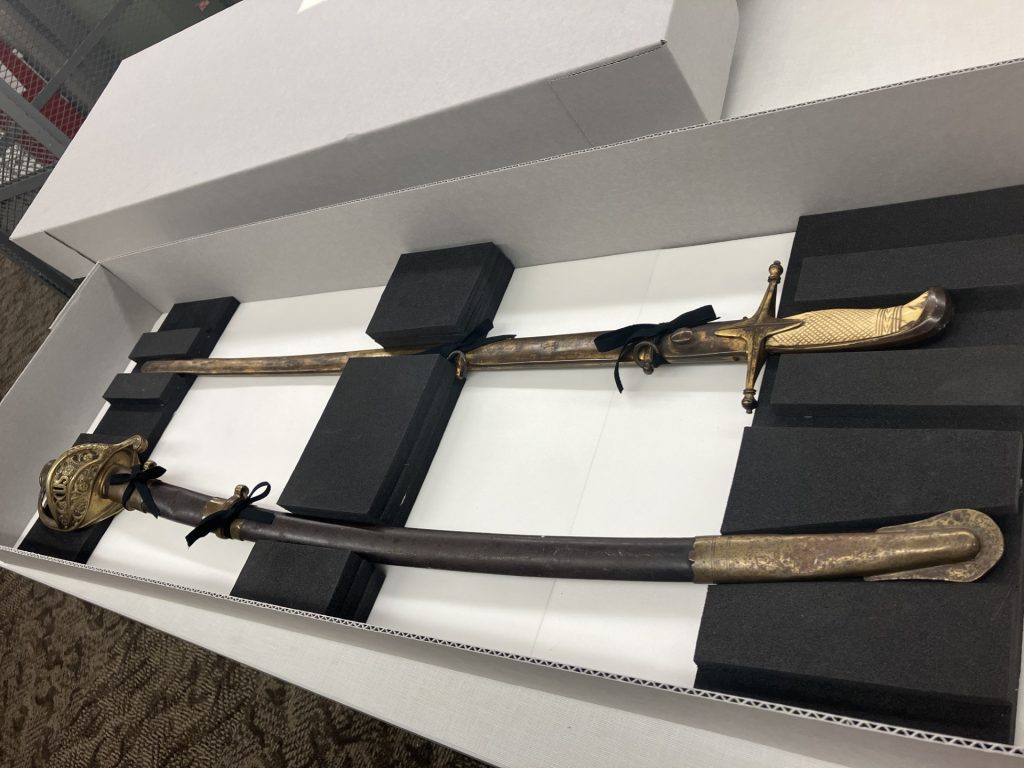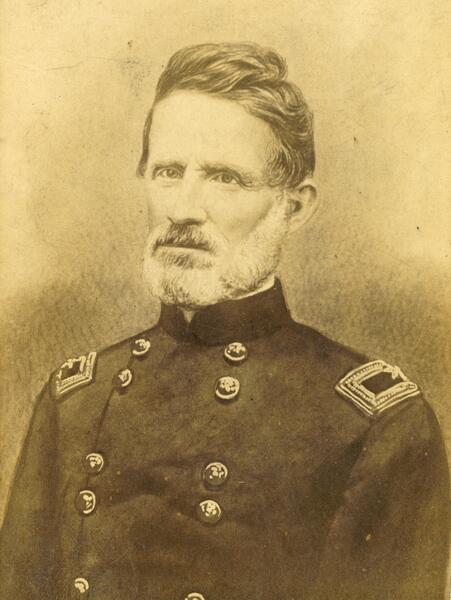
I first encountered the Jacob Ammen papers during my interview for my current position as Archives Assistant at the IU Archives. Following a chat with members of the full-time staff, I was given a tour of the facility. As I walked through the door separating the public reading room from the staff-only area, the first thing I saw was an open box containing two very old looking swords. “These,” explained Dina Kellams, Director of the Archives, “are the swords of Jacob Ammen. He was a military officer in the Civil War, and Professor of Mathematics and Military Science at IU!” The recent additions to the Archives were soon to be sent off to the Preservation Department for care and measurement for a specialty storage box. I could not have asked for a more compelling introduction to the professional world of Archives: it’s not every day that you get to handle artifacts from the Civil War! If these were the sorts of materials that laid just outside public view, I wondered, what other treasures might I encounter working at the Archives? I took the job.
A couple of months later, I had the opportunity to get to know Ammen more closely. I was tasked with processing his materials, that is, arranging and describing the collection for access by researchers. As it turned out, there was more in the collection than just his weapons: there were also several letters, a journal, and a photograph of Ammen. Poring over these materials and other background research, I attempted to reconstruct a coherent narrative of Ammen’s life from what little remained. From graduating West Point and serving in the military, to a somewhat tumultuous career in academia, to returning to military service as a Brigadier General in the Union army, Ammen lived a highly multifaceted life. A full account would be far too long to enumerate here.

As I developed a more comprehensive picture of Ammen’s life, the novelty by which I had initially been infatuated began to dissolve. Now, more clear-eyed, my focus with the materials shifted from Jacob Ammen the man, to Jacob Ammen the collection: I increasingly looked at the materials through an archival lens. In doing so, certain aspects of the collection prompted me to grow critical of its place in the IU Archives. Why are his collections here, at the IU Archives, and not at a more comprehensive repository? Indeed, Ammen was associated with Indiana University, but his time here constitutes such a small part of his life and legacy, not to mention that he did not look back on Bloomington particularly fondly.
Ammen’s professorship at IU was short-lived: he resigned from his position after only three years (1840-1843) following a pay cut from $1,200 to $1,000 per year (a reduction from about $50,000 to about $41,500 in today’s dollars). In his diary, he also recalls a distaste for the insularity that he saw in Bloomington. He felt that the town had little interest in interacting with the surrounding region and that it did not strive to flourish. Would Ammen have wanted his materials housed at an institution and in a town which he did not cherish? The more I looked, the more complicated the picture became. As Ammen indicates on the last page of his diary, he returned to teach in Bloomington in 1854. Maybe his relationship with IU wasn’t tarnished beyond repair? Then again, perhaps his return prompted him to swear off academia forever, as he abandoned teaching entirely in 1855 to pursue a career as a civil engineer.
In recounting this experience, I hope to provide to those unfamiliar with the inner workings of archives a glimpse beyond the reading room door — a look into a profession by which I, upon crossing that threshold, was immediately fascinated. The Ammen collection is evidence that archiving materials, much like the history surrounding them, is rarely clear-cut. Despite the well-established theory and best practices archivists follow, in practice the answer to almost every question that crops up during processing is, “it depends.” For the Jacob Ammen papers, the IU Archives holds this collection because the donors, themselves descendants of Ammen, entrusted them to us. Ammen is no longer around to decide where his materials go: that privilege is reserved for his family. Moreover, while the broad historical value of the collection is undeniable, we hold these materials precisely because they do pertain to IU history (even if only peripherally nor so favorably). This is not to say that the Archives doesn’t forward materials to more appropriate repositories as necessary. Rather, despite all the contingencies surrounding the collection, we nevertheless hold these materials because they do align with the mission of the IU Archives which is “to collect, organize, preserve and make accessible records documenting Indiana University’s origins and development and the activities and achievements of its officers, faculty, students, alumni and benefactors.”
The Jacob Ammen papers are accessible to the public for research, teaching, or pure curiosity. To learn more about the collection, consult the collection description and contact the University Archives for access!
2 Comments
Thank you so much, Beth! We feel so fortunate to be entrusted with Ammen’s legacy.
The family of Jacob Ammen appreciate the care and professionalism they’ve taken with regard to the artifacts entrusted to Indiana University. It feels these materials are indeed in the right place.